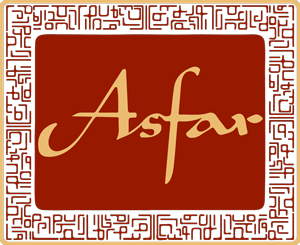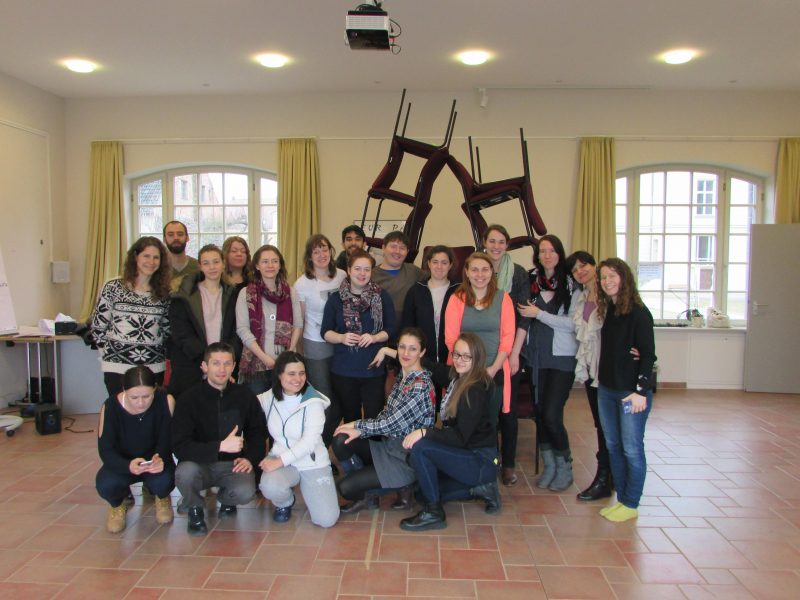My experience on a Asfar conflict resolution training programme abroad. An interview with Emma Knight
Emma participated in an Asfar international reconciliation programme called Betzavta in December 2017 and March 2018 to develop her skills both as a team leader and to manage conflict situations.
How did you hear about it and why did you decide to get involve?
The reconciliation Betzavta training was offered to me by Asfar and I decided to get involved, owing to the fact, I am a very calm and laid back individual, who would just allow others in professional and personal settings to take advantage of my kind nature. I previously gave into conflict for an easier life. I felt I needed to actively engage with others and their opinions, thus creating conflict in order to formulate the correct coping strategies in order to respond to conflict in my daily life!
What was the week like i.e. Activities?
The training took place in a remote village, 40 minutes outside of Berlin, in Trebnitz, Germany. It was a culture shock, as there was limited mobile internet reception and the Wi-Fi didn’t work outside the training room.
Training commenced straight away, on the first day and consisted of 6 days of intense learning. The intention of the training was to be trained, building upon the first Betzavta training programme, that I attended in Poland, December 2018. This time, the aim was for all participants to be trained in the Betzavta methodology, to facilitate our own Betzavta programmes at a later date.
What were the other people like?
It is the people on the training course that ensured that the Betzavta process was understood. Having participants from all over Europe; Romania, Poland, Croatia, Germany, Denmark, Spain and the UK, adds better cultural dimensions to conflict. It also helped that the group was full of interesting, frustrating and at times hilarious characters!
What were the partners like?
The partners consisted of; Tali, a calm, level headed, thought provoking trainer from Denmark and Iva, an observer / reflector, from Berlin, who draws upon her psychological knowledge, to give an in-depth view into the theories surrounding different aspects of confronted conflict. The two trainers work well together and it was great learning from them and their experiences.
How has the programme made a difference to you? As a young person, or as a learner etc.
The programme made a difference to me after I attended the initial training, as it allowed me to focus on myself and what i want from life. It then allowed me to go deep and unwind the layers of my thoughts and feelings as to why I think and feel the way I do, and how can I improve.
How has the project helped you in relation to dealing with conflicts?
Conflict surrounds me in every aspect of my life, since completing the first round of the training 5 months ago, I have been able to identify what my needs are, what others needs are and compromise to great effect. I have been able to remain calm and composed and this has helped me when others around me are losing their composure.
Looking back – what has been the 3 best things about participating in this programme?
Meeting the participants / trainers
Seeing different countries and being allowed to visit them on the day off during the programme.
But most importantly taking something away for myself from these training courses in being able to utilise the time and learning objectives to be put towards positive use.
Tell us about your inter-cultural experience and meeting other people from different backgrounds
Living in a multi-cultural and ethnically diverse town, makes me feel that inter-culture is a topic overused. Therefore, my inter-cultural experience was no different from meeting different cultures in my home town, talking about social injustice, corruption, politics and comparing our residing countries good and bad points. One thing that did surprise me was that the education system of mainland EU citizens, is far superior to the United Kingdom’s average comprehensive schools education. Even countries like Romania, that are deemed poor by the UK’s media, have a very high level of education, gained from the equivalent of a comprehensive school!
Whilst I was on the training, I felt as if my country is now poor and developing, like Romania and Bulgaria were, when they joined the EU. I developed this impression because of the standard of education, healthcare and affordable housing (in the south) appear to be below mainland EU standards.

